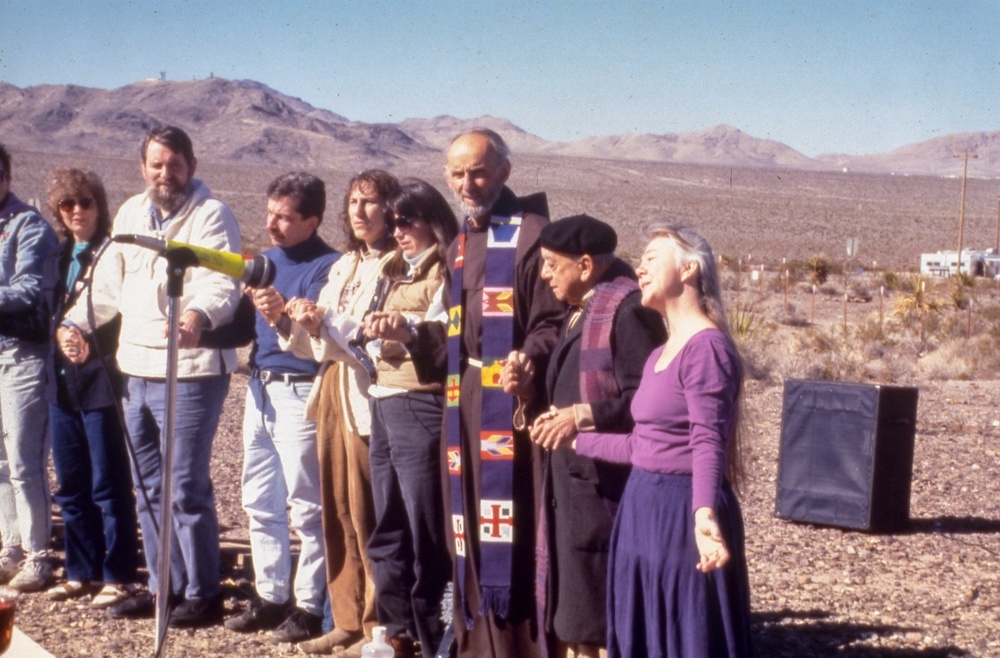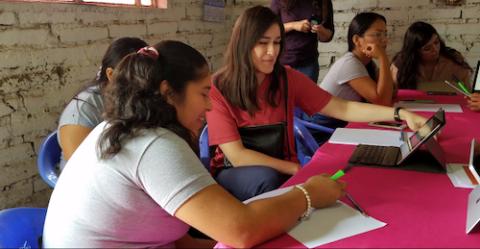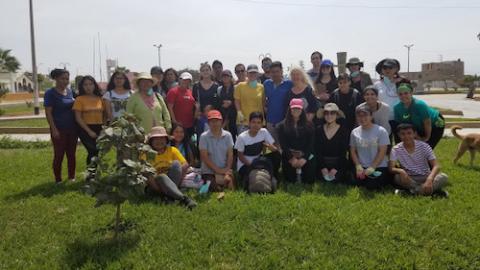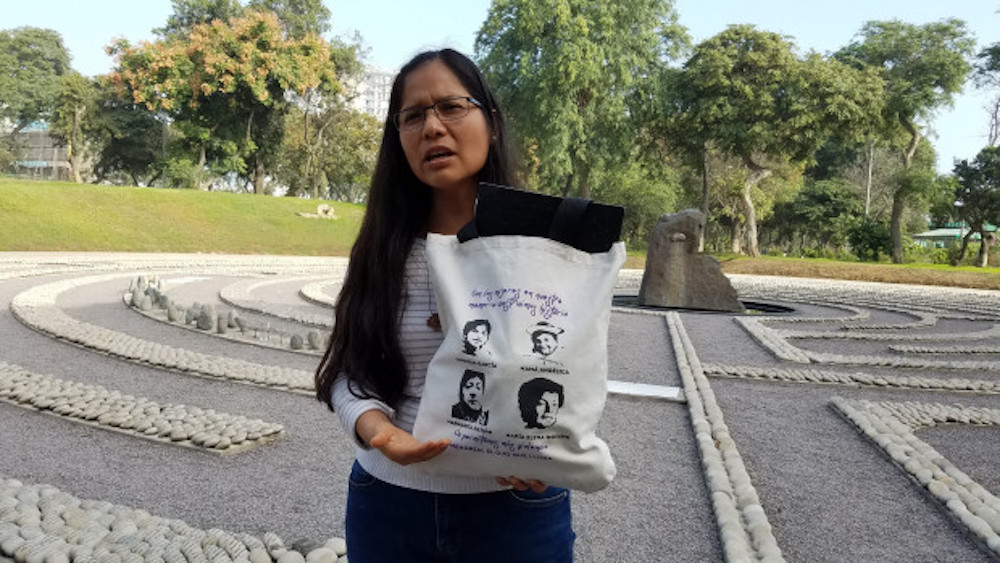
Sr. Martha Ann Kirk, right, Archbishop Dom Hélder Câmara, Franciscan Friar Louis Vitale, and friends pray for peace beside the Nevada nuclear test site during a 1991 retreat. (Provided photo)
Last spring, we took a solidarity and service trip to Peru sponsored by "Women's Global Connection" (WGC), a ministry of our congregation, the Sisters of Charity of the Incarnate Word, San Antonio. Some months before, we had contacted our partner women's group, Mujeres Emprendedoras, in a disadvantaged town in Peru and asked about their interests and needs. They were concerned about the growing trash and the pollution of their town. They wanted something to help clean up their town of Cambio Puente. A special need in that whole area is clean water.
Women speaking of "cleaning up" as a high priority reminded me of my explorations of women's prayer while in graduate studies. In the 1980s as I struggled and delighted in creating prayer, ritual, drama, dance and music enriched by women's perspectives for a doctoral dissertation in theology and the arts at the Franciscan School of Theology (part of the Graduate Theological Union in Berkeley, California), I wrote the lyrics for a dance called "Washerwoman God." My friend Colleen Fulmer wrote the music.
I start the dance as a powerful image of the divine leading an army and asserting control, when suddenly there is a transformation provoked by "Washerwoman God, splashing laughing free."
I dance, dialoging with and learning from this surprising Holy One,
If you didn't clean the mess where would we be?
Scrubbing, working, sweating God, cleansing you and me.
Make our hearts as clean as snow, wash us through and through.
Washerwoman, let us be like you.
In verse after verse, She brings rain water and ocean waves, washes dirty diapers, cleanses us with salty tears, helps us wash the dishes, and cleanses our hearts. Washerwoman God's son washed feet, transformed relationships.
Advertisement
Famed Brazilian Archbishop Dom Hélder Pessoa Câmara spoke of the U.S. Nevada site where it tests nuclear weapons as one of the most evil places on Earth because, there, people have made what could pollute and destroy all life. I had been invited to share for a Eucharistic celebration with Dom Helder and Franciscan Friar Louie Vitale, presiding in the desert beside the test site as part of a retreat initiated by the Franciscans in 1991.
I dramatized the pain of the polluted Earth, danced "Washerwoman God" and then spoke of her son washing feet and transforming relationships of power. Dom Helder held my hand as we were united in prayer, listening to the Holy One who cleanses, nurtures and consoles us. The Holy One tries to teach us circle dances of solidarity with peoples of the Earth rather than domination and threats of destruction. While the poor cry out for food and water for life, resources are squandered on what brings death. May we teach peace and build peace.
Monica Hernandez — one of our University of the Incarnate Word students finishing her doctorate in international education, and an intern with Women's Global Connection (WGC) — organized our other undergraduate and graduate students and friends preparing workshops for the Peru trip. Some concentrated on the importance of clean water and keeping clean, and they taught people how to use the water filters we took.
Others prepared to present on techniques of sustainability, conveniently called the five R's: Refuse, Reduce, Reuse, Recycle, Rot. A discussion format was used, sharing and learning what the women were doing already, with an emphasis on preparing them to teach others.

Yesenia Caloca teaches about reducing the amount of trash produced in the home. She found that the Mujeres Emprendedoras are conscious and very much in tune with the challenges that plague their town. The conversations were dynamic and raised many more questions around the topic of reducing household waste. (Martha Kirk)
Franco Encinas — a kind young man who often interprets for WGC groups in Chimbote, Peru — talked to one of his professors about our plans to teach and share water filters, and our plans to participate in a trash pick up. The professor encouraged a local television station to do a news feature on our projects. Carlos Enriquez, the Channel 33 newscaster, asked why we would come thousands of miles to pick up trash! We were invited to Universidad San Pedro in Chimbote to speak to a large group of students, and then to speak to another group at Universidad César Vallejo in Nuevo Chimbote. Student leaders from there wanted to join us for the trash cleanup in a few days. Good multiplies!
On a bright morning, Mujeres of Cambio Puente, their children, WGC travelers, and our new university friends began picking up trash around the central plaza. Much to our surprise, the mayor of Cumbia Puente arrived to thank us and to livestream our work. He invited all to carry forward the desire of the Mujeres to have more recycling and sustainability.
Global citizens unite to reduce, reuse and recycle. We work with Washerwoman God to clean our one precious Earth.

The Mayor of Cambio Puente, Eden Saul Miranda Marcello, center, in blue shirt, came to thank the students and Mujeres Emprendedoras. (Martha Kirk)
Another verse of the song "Washerwoman God" says,
You cleanse our face with many tears,
Salt that makes wounds clean,
Soaking deep and rinsing free,
Healing us of fear and pain.
In Lima, Sr. Katty Huanuco, the director of our Incarnate Word Sisters' Justice, Peace and Integrity of Creation Office, took us to the "Eye That Cries." This is a memorial where stones that have names remember victims, from a 3-year-old to one who was 103. Katty's Quichua-speaking family had fled the central part of Peru during the time of terrorism when about 70,000 people had been killed.
With most of the population of Peru trapped in poverty, some called for reform. Unfortunately, from about 1980 to 2000, both those calling for reform and the central government turned to violence rather than listening to the other. The Incarnate Word Sisters decided to stay among the people of Peru even in those years of violence.
We prayerfully walked and prayed among the stones, reflecting on how much truth and reconciliation are needed. May we be ministers of compassion, love, truth and reconciliation in a world that needs healing.

Sister Katty at the "Eye That Cries" Memorial in Lima, holding a bag with images of people killed. (Martha Kirk)
[Martha Ann Kirk, a Sister of Charity of the Incarnate Word, is professor of religious studies at the University of the Incarnate Word, San Antonio, and the author of Iraqi Women of Three Generations: Challenges, Education, and Hopes for Peace, based on her exhibit of photos and interviews.]







